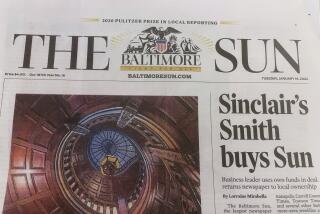W. German Publisher to Acquire Doubleday
- Share via
NEW YORK — Bertelsmann, the large West German publishing and entertainment conglomerate that owns Bantam Books and that just 19 days ago agreed to buy RCA’s record business, on Friday agreed to acquire Doubleday & Co., the large U.S. book publisher whose sale has been rumored for months.
Excluded from the sale was the lucrative New York Mets baseball franchise, which last week won the National League’s Eastern Division championship and has the best record in baseball this season. Doubleday, which owns 95% of the team, said the Mets will be sold separately.
For the rest of Doubleday, Bertelsmann offered to pay more than $500 million--$475 million up front plus what Doubleday sources estimate to be in excess of $25 million from the anticipated liquidation of several Doubleday landholdings.
Coupled with Bertelsmann’s pending purchase of the 75% of RCA/Ariola Records that it doesn’t already own, the agreement to buy Doubleday marks the emergence of Europe’s largest privately held communications company as a strong force in U.S. entertainment and publishing circles as well.
With about $850 million in annual sales, RCA/Ariola ranks third in the U.S. record industry after the record divisions of CBS Inc. and Warner Communications. And Doubleday, with 1986 fiscal year revenue of $472 million, is the second-largest U.S. book publisher after Simon & Schuster.
Meanwhile, an $80-million offer to buy Doubleday’s interest in the Mets was made Friday by J. Morton Davis, owner of the Wall Street investment firm D. H. Blair.
Davis, noting that the offer is contingent upon reviewing the ball club’s financial statements, said in a telephone interview that he would consider sweetening his offer if the team’s financial health merits it. The team has been estimated to be worth between $75 million and $100 million.
Another Suitor
He also disclosed that he has written to the only other known suitor--a partnership of Mets President Fred Wilpon and Nelson Doubleday Jr., chairman both of the Mets and of the closely held Doubleday publishing concern--to offer his financial support in the event that “they want to minimize their investment” but remain active managers of the team. Under that proposal, he would own either all of the team or “a major interest,” said Davis, who specializes in taking private companies public and who owns 3% of Doubleday’s stock.
Davis, who considers owning the Mets more “a lifetime dream” than a fabulous investment opportunity, said that as of late Friday neither Doubleday nor Wilpon, who owns the 5% of the team that Doubleday & Co. doesn’t, had responded to his letter.
Nelson Doubleday Jr., a descendant of the man who is often credited with inventing baseball, Abner Doubleday, told the New York Times on Thursday that he and Wilpon intend to buy the Mets from the Doubleday family book company for an undisclosed price. An assistant to Doubleday on Friday confirmed the validity of that report.
But George Wiegers, a managing director of Dillon, Read & Co., the investment banker advising Doubleday, said Friday that while a bid from Doubleday’s chairman and majority owner “would obviously be carefully reviewed,” the company’s board cannot just sell the Mets to Nelson Doubleday without first weighing all offers. As of late Friday afternoon, Wiegers said, he hadn’t received a formal offer from Doubleday and Wilpon, who retains a first right of refusal to buy Doubleday’s interest in the Mets before it can be sold elsewhere.
Nelson Doubleday’s decision several months ago to sell the company took the publishing world by surprise--despite the fact that his passion for baseball is said to have always been stronger than his interest in publishing. It was he who arranged for Doubleday & Co. to buy 95% of the Mets in 1980 for $21 million.
“A couple of years ago, he invited me to a Mets game and I took the opportunity to approach him about taking the company public,” said J. Kendrick Noble Jr., a publishing analyst at the Wall Street brokerage Paine Webber Mitchell Hutchins. “He laughed at that. It was clear even then he was mostly interested in the Mets.”
Wall Street doesn’t follow Doubleday closely because, like most book publishers, it is privately held. But analysts had guessed in the days before the announcement that the price tag would be between $300 million and $400 million.
What those estimates didn’t consider, however, was the current interest in media properties and the premium a buyer is willing to pay for “a unique property,” said Noble. Also in its favor was a sales and earnings turnaround orchestrated over the past year by Doubleday and his former brother-in-law John Sergeant, Noble said.
“Things like this,” Noble said, “don’t come on the (book publishing) market very often.”
In fact, Doubleday “has been receiving offers for years,” said Wiegers of Dillon, Read. “But just this year, because of his own personal and family situation, did he decide to listen to the overtures.”
Wiegers wouldn’t say who the suitors--other than Bertelsmann--were. But it has been widely reported that Time Inc., Random House and Gulf & Western were among them.
This summer, Doubleday retained Dillon, Read, which distributed a detailed financial prospectus on the company to about a dozen potential suitors. Of those, Wiegers said, Doubleday had “intensive negotiations” with four or five.
The Bertelsmann talks, he said, have been ongoing “for about a month.”
Bertelsmann said it expects the sale, which requires shareholder and Justice Department approval, to be completed later this year.
It is Doubleday’s extensive network of book clubs that particularly caught Bertelsmann’s eye.
The company is most celebrated in Europe for its book clubs, which boast about 17 million members worldwide. Thus, sources say, the prospect of acquiring Doubleday’s many book clubs, and particularly its huge Literary Guild club, is what piqued Bertelsmann’s interest. Literary Guild is second in size only to the Book of the Month Club.
Expansion-minded Bertelsmann has made no secret of its desire to penetrate the American music and publishing industries.
DOUBLEDAY HOLDINGS Doubleday book publishing Dell paperback publishing Delacorte hardback publishers Literary Guild book club (largest of its 12 book clubs) Laidlaw Bros. textbooks Printing plants 95% owner of the New York Mets Fiscal 1986 revenue of $472 million; net income of $7 million. BERTELSMANN HOLDINGS Bantam Books Parents magazine Young Miss (YM) magazine Brown Printing RCA/Ariola Records (pending) Der Stern, German news magazine 1985 sales $3.655 billion, of which about $730 million from U.S. media market.
More to Read
The biggest entertainment stories
Get our big stories about Hollywood, film, television, music, arts, culture and more right in your inbox as soon as they publish.
You may occasionally receive promotional content from the Los Angeles Times.










